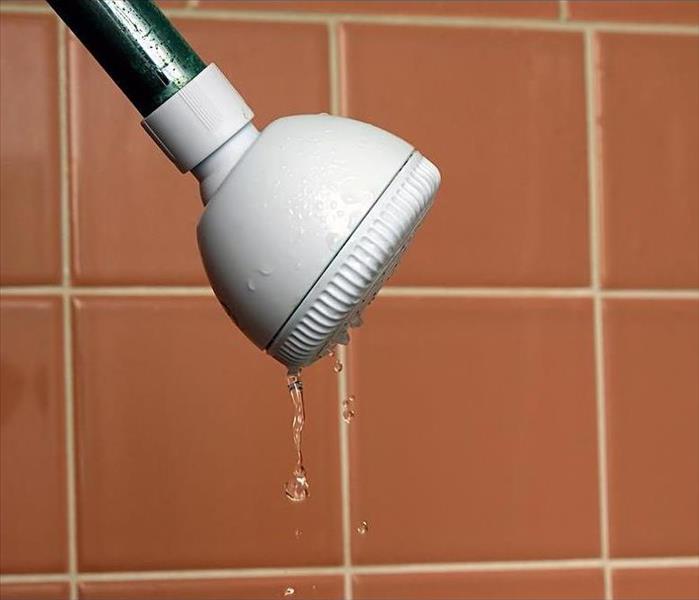Signs of a Shower Leak and What to Do
11/3/2022 (Permalink)
 If you have a leak in your shower, it could be caused by any number of things. Call SERVPRO of Tri Cities West/ SERVPRO of Franklyn County.
If you have a leak in your shower, it could be caused by any number of things. Call SERVPRO of Tri Cities West/ SERVPRO of Franklyn County.
Signs of a Shower Leak and What to Do
You've just stepped out of a relaxing shower, and the water is still flowing. You think nothing of it—it's just extra water, right? But what if that extra flow could be an indication of a much bigger problem that leads to costly repair bills and even more frustration? Read on to learn how to detect leaks in your bathroom or basement before they get out of hand.
Inspecting a Drain and Shower Pan
The shower pan is the base of your shower. It's usually made of fiberglass, concrete, or plastic. The drain and valve are connected to it so that water drains away from your house when you use the shower. Shower pans can be damaged by water, mold, or rust.
To inspect for a leak, you should start by looking at the shower drain. If you notice water stains on the ceiling or walls in your bathroom, this is an indication that there may be a leak in your drain.
If you think something might be wrong with your shower pan, it's also important to check that area as well. You can find out if there are any leaks by using a pool tester—essentially a tube filled with black dye and chalk that detects moisture when placed against an object.
If you have a leak in your shower, it could be caused by any number of things: a cracked floor tile; corrosion on piping joints; or maybe even a burst pipe! If you suspect there's an issue with your plumbing system in your Franklin County home, call SERVPRO of Tri Cities West/Franklin County today!
Calling a Professional
If you're not sure whether or not you have a leak, don't be afraid to call a professional. Your first step should be to take your time and look around the room. Look for small puddles of water on the floor and feel along walls for dampness and mold growth. If this doesn't work, it's time to call in an expert.
There are many reasons why a professional damage restoration expert or plumber may be needed:
- if you can't find the leak
- if there is a leak coming from behind a wall
- if there is no visible evidence of where the leak is coming from
- if your attempts at fixing it yourself have failed (or are too difficult)
Act Quickly
If you ignore the problem, it can lead to serious consequences. Water damage is one of the most common results of a leaky shower. The constant moisture can cause mold growth and insect infestation, as well as wood rot or rust on fixtures like pipes and faucets. If you notice any water damage around your house, it's important to get it addressed immediately so that it doesn't become an even bigger issue down the road!
Tips for Preventing Shower Leaks
To prevent leaks in your shower, you should:
- Perform regular maintenance on your shower pan. This includes checking for any cracks or chips in the tile and fixing any that are found.
- Make sure you have a drain cover designed to fit over your drain. A good choice would be a grated drain cover made out of stainless steel or fiberglass, which will help prevent clogs from hair and soap scum buildup while also allowing water to flow freely through the grate without damaging it or causing other problems with drainage flow rates and pressure levels when used as directed by manufacturer recommendations (i.e., keep at least 1” away from walls).
- Make sure that your drain is properly aligned. This will make sure it drains correctly, leading away from where water could leak into another part of your house.
Water Damage Can be Expensive
Water damage caused by a leak or malfunctioning drain or valve can be expensive to fix. If you ignore a leak, it can cause more damage than if you had fixed it right away. This is why it’s so important to know what to look for when inspecting your shower pan. Look at the floor around the base of your shower curtain rod. If there is any evidence that water has seeped through the subflooring and onto the carpet underneath, there may be a problem with your drain assembly or some other system in place below your shower pan.
The most important thing to remember is that your home is your castle. If there’s something wrong with it, you want to know about it before it becomes a serious problem. Don’t put off investigating any signs of water damage—it could lead to much more expensive repairs down the road!



 24/7 Emergency Service
24/7 Emergency Service